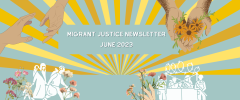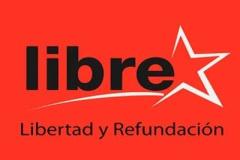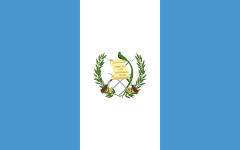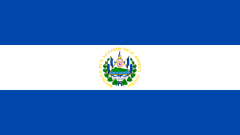Samuel Ritholtz and Kiran Stallone. The Guardian. February 3, 2022
In a mountain town near the north coast of Colombia, three drag queens strike poses in the blazing sun. Wearing extravagant Caribbean carnival costumes, they place each high heeled step carefully to avoid puddles. Neighbours come out to take photos and cheer.
This impromptu show has unique significance in the streets of El Carmen de Bolívar, representing the remarkable resurgence of a community once brutally victimised by homophobic armed groups.
For nearly 30 years, the town and surrounding region of Montes de María were infamous for violence perpetrated against LGBTQ+ individuals, targeted at one time or another over the country’s long civil war by rightwing paramilitaries, leftwing guerrillas, government soldiers and the police.
In the 1990s, paramilitaries formed in response to leftist activism and insurgency throughout Colombia. They took over El Carmen de Bolívar – a geographically strategic town of approximately 70,000 people with a history of leftwing activism and violently repressed those they viewed as proxy guerrilla supporters.
“People could not say that they were from El Carmen de Bolívar because that meant they were guerrillas,” says Veronica, 35.
Many of the armed groups in the region – publicly aligned with the country’s conservative elite – began persecuting the LGBTQ+ community. While such brutality was widespread in Colombia, in El Carmen de Bolívar and the surrounding region of Montes de María, it was made particularly public – including with forced boxing matches between gay men and transgender women.
Sexual violence was rampant and meted out as a punishment. Those who resisted risked being taken in a van known as the “final tear”, as the people it picked up never returned.
Yirley Velazco – a survivor of a paramilitary massacre and social leader in the neighbouring town of El Salado – remembers a helicopter dropping pamphlets in 1999 with a warning to LGBTQ+ people: get out now.
“They named people who were part of the LGBTI community,” she says. “They said they were going to kill them for being gay, that they were going to kill them for not being part of mainstream society.”
In El Carmen de Bolívar, La Pola, a 42-year-old trans woman, received similar leaflets, telling her to leave the area or be killed. Paramilitaries took over her house and used it as a base.
Today, after leaving twice for nearby Cartagena to protect herself from violence, La Pola has returned to El Carmen de Bolívar, where she works as a hairdresser. She is grateful to be able to speak about what happened to El Carmen de Bolívar’s LGBTQ+ community, and hopes it will be widely heard. “We have to be visible,” she says.
Despite ongoing insecurity from drug trafficking groups like the Clan del Golfo, LGBTQ+ people in El Carmen de Bolívar say they feel more secure now than ever before.
Corey, a gay 46-year-old, says he has experienced a huge change over the years.
“I feel very happy because we can go out without any problems. Before we were afraid to go out, and if armed groups found us on the street at midnight, they could take us away, torture us, or send us home.” He says he has LGBTQ+ friends who “fled from El Carmen de Bolívar out of fear”.
“We’re conscious that armed groups are returning to the territory, but at this moment, there haven’t been any threats directly against the LGBT community,” says Tito, 30.
This new perceived security and acceptance is in part the result of a campaign by Caribe Afirmativo, an organisation which runs a community centre in the town. Services include a soup kitchen and job training, as well as outreach work to support understanding of the LGBTQ+ population.
Dr Wilson Castañeda Castro, director of Caribe Afirmativo, says that alongside advocacy, training, and research, the group provides safe spaces for LGBTQ+ people in “periphery territories”, areas with limited government attention.
Nawar, 26, a trans woman, is grateful to Caribe Afirmativo, saying the organisation taught her “to defend the human rights of the LGBT population”.
“One of the things that makes me happy in El Carmen de Bolívar is that my advocacy work has been heard, that we have made progress, and that we have changed society,” she says.
Castañeda warns that this sense of security in El Carmen de Bolívar is fragile – given the increasing violence in Colombia’s war-ravaged regions. He cautions that the increased visibility of LGBTQ+ people in national politics can reinforce discrimination, as the flames of homophobia are fanned for political gain.
People in El Carmen de Bolívar still often face employment discrimination because of their sexual or gender identity, but say that they appreciate the current security as a time to flourish.
After years of abuse and threats, Tito, 30, runs a folk dance group with many LGBTQ+ participants that has performed across Colombia.
“It gives me a lot of joy to see how we have been able to achieve so much in a place that people thought was impossible,” he says.
In one of the most dramatic departures from the past, the LGBTQ+ community is actively engaged with the town’s police and has developed a training and awareness programme for officers.
In 2020 the Colombian national government formally recognised the collective damage suffered by the LGBTQ+ community of El Carmen de Bolívar because of the conflict, the third community in the country to receive this recognition. The ruling means support for the region’s efforts to document the community’s history.
“This recognition is a possibility to promote a transformative reparation, for individuals and the collective,” says Castañeda, “that can heal old wounds and propose a new alternative, concrete reality to protect human rights in their daily lives.”
Some names have been changed.





